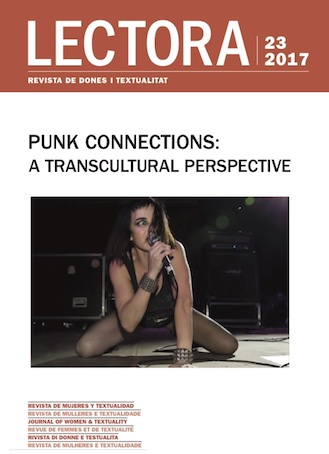The Queer Collapse of Civilization: Mariko Ōhara's "Shōjo"
DOI:
https://doi.org/10.1344/Lectora2017.23.10Paraules clau:
Mariko Ōhara, performativity, gender, queer, science fictionResum
This article analyses Mariko Ōhara’s short story “Shōjo” (1985) and its attempt at deconstructing the sex-gender system, focusing on the three main characters: Gil and his two sexual/love interests, Kisa and Remora. By examining the story from both gender and animal studies, the aim is to reflect on how the ideas of sex, gender and performativity are inserted into a vaster social construction that also merges with class and animality. We also consider how the recurrent image of decadence and what can be considered a return to a heteronormative situation do not undermine the overall process of deconstruction and social critique offered by the story.
Referències
Amis, Kingsley (2012), New Maps of Hell, London, Penguin Classics. Digital edition. [1960]
Arons, Wendy (2001), "'If Her Stunning Beauty Doesn't Bring You to Your Knees, Her Deadly Drop Kick Will'. Violent Women in the Hong Kong Kung Fu Film", Reel Knockouts. Violent Women in the Movies, Martha McCaughey and Neil King (eds.), Austin, University of Texas Press.
Butler, Judith (1993), Bodies that Matter, New York, Routledge.
—(1999), Gender Trouble, New York, Routledge. [1990]
—(2004), Undoing gender, New York, Routledge.
De Beauvoir, Simone (2012), The Second Sex, New York, Random House. [1949]
Freedman, Carl (2000), Critical Theory and Science Fiction, Middletown, Wesleyan University Press.
Harada, Kazue (2015), "Japanese Women’s Science Fiction: Posthuman Bodies and the Representation of Gender", Arts & Sciences Electronic Theses and Dissertations, 442, 15/05/2015.
Kotani, Mari (2004), Alien Bedfellows, Tokyo, Sōhakusha Publishers.
—(2007), "Alien Spaces and Alien Bodies in Japanese Women’s Science Fiction", Robot Ghosts and Wired Dreams. Japanese Science Fiction from Origins to Anime, Christopher Bolton, Itsvan Csicsery-Ronay Jr. and Takayuki Tatsumi (eds.), Minneapolis and London, University of Minnesota Press.
Lefanu, Sarah (1988), In the Chinks of the World Machine: Feminism and Science Fiction, London, The Women’s Press.
Mizzi, Shanon (2014), "Star Trek's Underappreciated Feminist History", The Wilson Quarterly, 17/10/2014.
Mulvey, Laura (1989), Visual and Other Pleasures, London, Macmillan.
Ōhara, Mariko (2007), "Girl", Speculative Japan vol.1, Alfred Birnbaum (trans.), Gene van Troyer and Grania David (eds.), Kumamoto, Kurodahan Press: 153- 169.
Russ, Joanna (2017), "The Image of Women in Science Fiction", Science Fiction Criticism. An Anthology of Essential Writings, London and New York, Bloomsbury.
Vint, Sherryl (2007), Bodies of Tomorrow: Technology, Subjectivity, Science Fiction, Toronto, University of Toronto Press.
—(2010), Animal Alterity. Science Fiction and the Question of the Animal, Liverpool, Liverpool University Press.
—(2014), Science Fiction. A Guide for the Perplexed, London and New York, Bloomsbury.
Descàrregues
Publicades
Com citar
Número
Secció
Llicència
Els autors i les autores conserven els drets d’autoria i atorguen a Lectora: revista de dones i textualitat el dret de difusió. L'’obra serà disponible simultàniament sota una Llicència de Reconeixement-NoComercial- SenseObraDerivada de Creative Commons que, si no si indica el contari, permet compartir l’obra amb tercers, sempre que aquests en reconeguin l’autoria i la publicació inicial en aquesta revista.
Els autors i autores són lliures de fer acords contractuals addicionals independents per a la distribució no exclusiva de la versió de l’obra publicada a la revista (com ara la publicació en un repositori institucional o en un llibre), sempre que se’n reconegui la publicació inicial en aquesta revista.
S’encoratja els autors i autores a reproduir la seva obra en línia (en repositoris institucionals, temàtics o a la seva pàgina web, per exemple), amb l’objectiu d’aconseguir intercanvis productius i fer que l’obra obtingui més citacions (vegeu The Effect of Open Access, en anglès).




